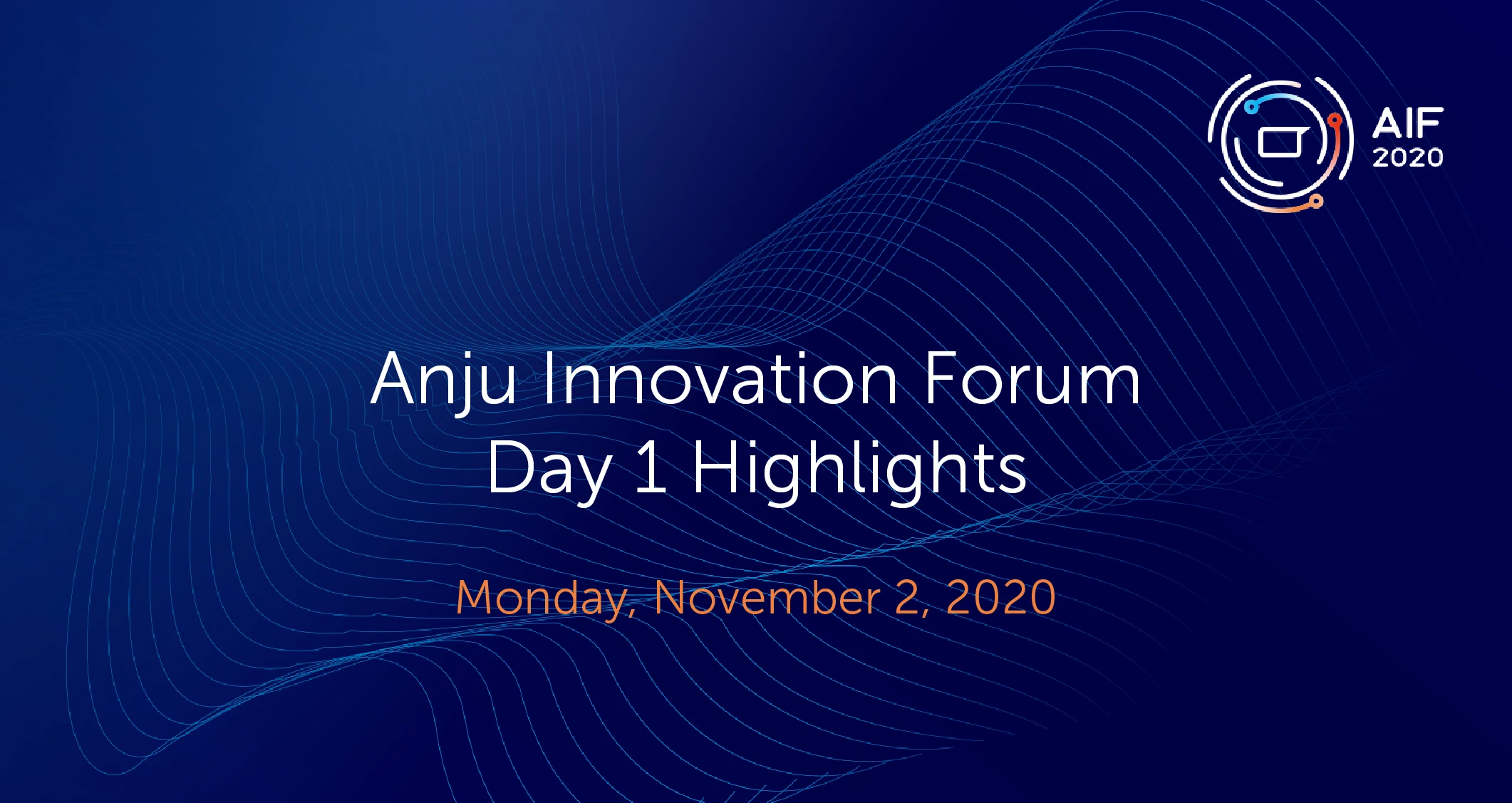Changing Data Demands Changing Face of Life Sciences
If there was one message that came out of Day 1 of the first-ever Anju Innovation Forum it is this: 2020 is a year that changed the data capture and data management challenges of the life sciences industry and revealed the need for accelerated yet adaptive solutions – from hybrid virtual and on-site clinical trials to wider diffusion of medical information and content within pharma organizations and to customers and patients on a global scale.
These were the themes that were explored by the speakers and sessions of the first day of the Forum. Here is a brief recap of the day:
- In the opening session, Anju CEO Kurien Jacob and CTO Suhas Gudihal highlighted the changes in the healthcare landscape including the continued focus on payer-driven outcomes accelerated in this year of COVID, and how Anju’s product development roadmap is focused on designing systems that are built for change to reflect how clinical studies and trials are changing and how medical and science content is changing. Gudihal showcased how Anju is evolving its data systems architecture to creating product solutions that can in the future monitor adverse drug reactions and manage population health. CRO Nick Campbell closed the discussion with an explanation of how Anju redefines collaboration with not only customers but our customers’ partners and customers to develop solutions that adapt to, augment and enhance and not disrupt or replace the customer’s existing technology systems if that is not what they want. The three addressed attendee’s questions in the “Ask the Experts” session that followed, reiterating the goal of data-driven medication guidance and Anju’s adaptive approach to help customers get there.
- The highlight of the day was Clinical Partners’ Craig Lipset’s keynote on how COVID changed fundamental approaches to clinical trial design and how the risks of not integrating virtual tech like telehealth, mHealth tech and medical devices and site tech into trial design to keep promising drugs moving through the pipeline to patients outweighed trial data integrity risks. Lipset highlighted pharma’s flexible response and transition to an all virtual, decentralized trial model at the peak of COVID, and a hybrid virtual/onsite model post-peak, recognizing patient desires for options to how they can participate in trials. He emphasized the need for pharma to commit organizationally to new remote trial design approach protocols, and they need to recognize that costs would not necessarily decrease for removing patient burdens to trial participation. Lipset challenged the industry to identify the next Operation Warp Speed trials process for COVID vaccines, maybe for Alzheimer’s or Duchenne muscular dystrophy. His take-away message was that pharma needed to embrace tech more widely as a conduit for capturing new sources of patient data in clinical trials that may be difficult to capture at trial sites in the future, especially if new COVID waves come.
- In a later larger group panel discussion on whether COVID is supercharging a move to decentralized clinical trials, Lipset and the panel cautioned that barriers to trial recruitment and diverse patient participation have been heightened by a number of factors including a decrease in trust in remote trial participation because of community social unrest, differences in state and federal privacy laws about using patient data, the security of patient health data contained in consumer wearable devices. All agreed that COVID produced a patient data deficit due to lower engagement that has impacted study design and that remote tech can help reduce that deficit and sustain the trials pipeline.
- Several sessions looked at changes in the Medical Affairs field: the growing complexity and volume of medical information and content, the stretched bandwidth of internal MA teams, and how the Anju ECM suite offers an end-to-end solution for managing and integrating disparate internal and external content and data sources as well as new ways to access medical content by stakeholders across an organization. Pharma MA team dependence on call center data and analytics for dissemination of increasingly complex medical info and content to consumers and providers as well as delivering such content over mobile devices, texts, social media portal platforms, and even voice tech like Alexa or Siri going forward was also discussed. A consensus was voiced on the need for single source touch medical information systems where medical affairs can collaborate with safety and quality on incoming cases or queries and how AnjuBUS can enable such a system. Finally, it was noted that numerous ECM systems are costly investments for pharma that take a long time to become live and that the AnjuSafe ECM platform can be deployed relatively quickly at a far lower cost because it adapts to existing content infrastructure environments.
- Day 1 ended with sessions highlighting new innovations in parts of the Anju eClinical solution suite, including a patient randomization simulator feature that optimizes patient selection and reduces study design change risks, adaptive trial design support for adjustments as a trial progresses and IRTMaster that can manage and control drug dispensing flow to sites around the world. The final session of the evening actually showcased Anju eClinical solutions success in another part of the world – China – and how Anju’s TrialMaster accelerated a clinical trial and study for oncology biologics manufacturer Innovent in that market.
Yes, Day 1 was a whirlwind of a day to kick off Anju Innovation Forum. We can’t wait for Day 2. Don’t miss our first session today at 9 AM EST!
#AIF2020 #AnjuInnovationForum
For more information about Anju events, contact marketing@anjusoftware.com
